Components of Food
NCERT Class 6th Science Chapter 2-Components of Food-Audio Notes, Solution,Video, PDF
Notes
[responsivevoice voice="UK English Female" rate="0.8" pitch="0.8" buttontext="Listen to this"]
Introduction
- What we eat in our day to day life to provide energy to our body is called food.
- People in different parts of our country eat different kind of food.
- For example: In northern part of India chapattis, dal, vegetables like brinjal, lady’s finger, potato, etc. were eaten. Whereas in southern part of India rice, sambhar, uttapam, etc. were eaten, this is due to the availability of food in that particular area.
- Other items like fermented food for example: curd, idli, dosaand dish of meat, chicken, fish are also eaten. [/responsivevoice]
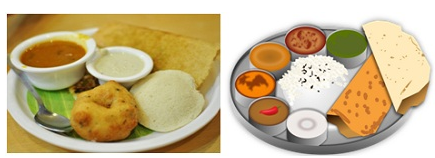
[responsivevoice voice="UK English Female" rate="0.8" pitch="0.8" buttontext="Listen to this"]
Nutrients: Food should contain such type of component which provides nourishment to our body and should be responsible for the growth and development of our body. These components are called nutrients.
Whatever food we eat is made up of more than one component taken from plants or animals.
Our food contains mainly five major kinds of nutrients namely vitamins, minerals, carbohydrates, proteins and fats. Additionally, food also contains water and dietary fibres/roughage and water which are also required by our bodies.
- Energy giving nutrient: Carbohydrate and fat
- Body building nutrient: Protein
- Nutrient protect body from disease: Vitamins
- Nutrient needed for growth and maintenance: Minerals
[/responsivevoice]
[responsivevoice voice="UK English Female" rate="0.8" pitch="0.8" buttontext="Listen to this"]
Carbohydrates: Carbohydrates main function is providing energy to the body. These are found in our food in the form of glucose and starch i.e. simple and complex carbohydrates.
Example It is found in potato, rice, bread, sugary drinks like fruit juices, wheat etc.
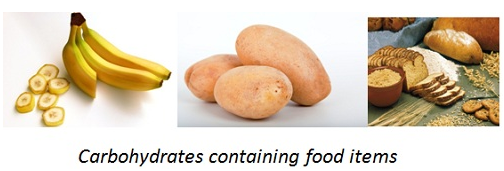
Test of starch:
- Test for carbohydrates: We can test whether a particular food item contains carbohydrates by pouring 2 to 3 drops of dilute iodine solution on it.
- If the iodine changes its colour to blue-black, then we can ascertain that the food item does, in fact, contain carbohydrates. [/responsivevoice]
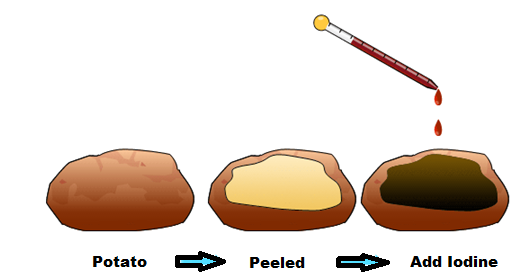
[responsivevoice voice="UK English Female" rate="0.8" pitch="0.8" buttontext="Listen to this"]
Fat : Fats are also responsible for providing energy to our body. In fact, they provide more energy than carbohydrates.
- The body uses fat as a fuel source.
- Fats are essential for the absorption of vitamins A, D, E and K in the body.
- Fat also provide energy to our body more than carbohydrate.
- Fat may also be hazardous to our health. It can cause high cholesterol and heart diseases.
- Ghee, cheese, butter, oil, cream are some food items containing fat.

Test of Fat: To test the presence of fat, take a piece of butter on a paper rub it at the center. You will observe the oily patch on the paper. This oily patch is fat. [/responsivevoice]
[responsivevoice voice="UK English Female" rate="0.8" pitch="0.8" buttontext="Listen to this"]
Proteins: Proteins performs the very essential function of helping our body grow and repair itself. These are found in food items such as Egg, meat, fish, oats, dal, almond, milk, yogurt are some rich source of protein.
- Foods containing proteins are called ‘body-building’ foods.
- Nails, hairs, skin, muscles and blood all are made up of proteins.

Test for proteins: To test whether a food item contains proteins,
- first we need to grind it into a paste or powder form and add 10 drops of water.
- To this mixture when we add 2 drops of copper sulphate solution and 10 drops of caustic soda solution.
- After a few minutes, if the mixture turns violet, it is indicative of the presence of protein.
- Violet color indicates the presence of proteins. [/responsivevoice]
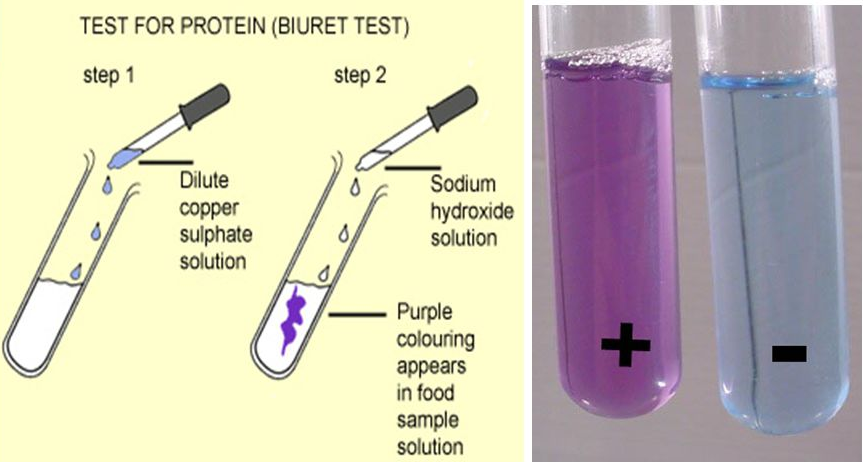
[responsivevoice voice="UK English Female" rate="0.8" pitch="0.8" buttontext="Listen to this"]
Vitamins : Vitamins help in protecting our bodies from various kinds of diseases. They also help in keeping our eyes, gums, bones and teeth in good shape.
Different types of vitamins and their uses: [/responsivevoice]
| Vitamins | Benefits | Rich source |
| Vitamin A | Good for our skin, hair and eyes | carrot, sweet potato |
| Vitamin C | Good for immunity | Found in citrus fruits like lemon, orange, tomato |
| Vitamin D | Helps our body to use calcium for bones and teeth | Our body makes Vit. D in the presence of sunlight of its own.
We need calcium from external source. |
| Vitamin E | Good for our vision | Found in almonds, peanuts |
| Vitamin K | Good for our blood | Found in spinach, broccoli |
- Vitamin B- complex containing group of 8 Vitamins Vit.B1, Vit.B2, Vit.B3, Vit.B5, Vit.B6, Vit.B7, Vit. B9 and Vit.B12. The B vitamins play an important role in cell metabolism.

[responsivevoice voice="UK English Female" rate="0.8" pitch="0.8" buttontext="Listen to this"]
Minerals : Minerals are used by the body to perform various functions like building strong bones, maintaining the heartbeat, making hormones etc.
The major minerals are Calcium, Phosphorus, Magnesium, Sodium iron, zinc and Potassium. Examples of mineral-rich foods include leafy vegetables, fish, beans etc.
- Minerals were needed in traces amount, but is essential component as well.
- Minerals are necessary for building proper growth and maintenance of our body. [/responsivevoice]
| Mineral Type | Sources | Functions | Deficiency Disease |
| Calcium | Tofu, Dairy products, Salmon, Cabbage, Kale and Broccoli | Essential for efficient functioning of nervous system and healthy bones | Weak bones, lower than normal bone density and stunted growth |
| Phosphorous | Lean meats, grain and milk | Essential for the maintenance of acid-base balance in body | Loss of appetite, bone fragility, muscle weakness, poor physique |
| Iodine | Green leafy vegetables, Seafood, iodized salt | Formation of thyroid hormone | Goiter- Enlargement of thyroid gland, mental disability. |
| Sodium | Table salt, celery | Helps keep control on blood pressure | Nausea, irritability |
| Iron | Whole grain, eggs, leafy vegetables and meats | Essential for hemoglobin formation in rbc. | Anemia – weakness, fatigue, shortness of breath |
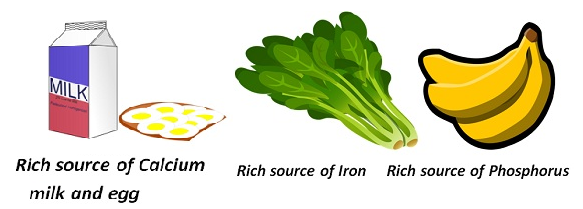
[responsivevoice voice="UK English Female" rate="0.8" pitch="0.8" buttontext="Listen to this"]
Dietary Fibers: While dietary fibers do not provide any such nutrition to our bodies but nevertheless are an important component of food.
They help in easy absorption of food, helps in movement of bowel and prevents constipation. It helps our body get rid of undigested food. Cereals, fruits and vegetables are some of the roughage rich foods.
Water: Water performs the essential function of absorbing nutrients from our food. It also helps in releasing waste from our body in form of sweat and urine.
[/responsivevoice]
[responsivevoice voice="UK English Female" rate="0.8" pitch="0.8" buttontext="Listen to this"]
Balanced Diet :
- A balanced diet is one that contains a variety of food items providing different types of nutrients in adequate amounts necessary for maintaining good health. Our diet should contain roughage (raw uncooked vegetables)and water.
- A balanced diet includes a combination of protein-rich pulses, sprouted seeds etc. with combinations of various flours and cereals for carbohydrates and fats along with fruits and vegetables which provide the necessary vitamins and minerals.
- The food that a person eats in a day is called diet.
- Balanced diet depends on the age and the type of physical work we do.
- For example: an athlete would consume more amount of carbohydrate to gain more energy, an old age person would consume food which can be easily digestible.
- Most of the vegetables and fruits skin contain good amount of vitamins and minerals.
- Continuous washing, boiling or overcooking vegetables would loss many nutrients present in them.
[/responsivevoice]
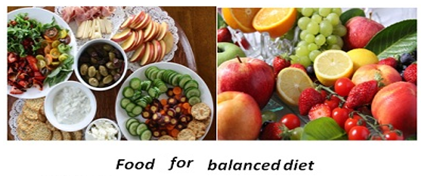
Obesity:
Obesity is an excess accumulation of fat in our body results from excess intake of fat-rich foods.
- The excess fat gets accumulated to such an extent that it starts negatively affecting one’s health, well-being and the ability to carry out certain activities.
- Fat contains more amount of energy than carbohydrates. But continuous intake of fat would cause deposition of fat in our body.
- Most of the junk food and oily food contains lots of fats. One should utilize the fat in the form of physical energy to balance the body.
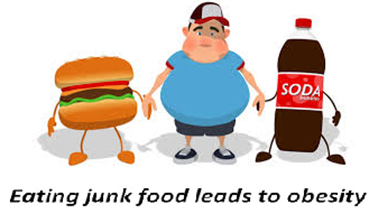
[responsivevoice voice="UK English Female" rate="0.8" pitch="0.8" buttontext="Listen to this"]
Deficiency Diseases :
Sometimes simply getting adequate amounts of food might not be enough if the food does not contain the required nutrients in the right amounts. Prolonged usage of such nutrient-less food may result in a condition known as Deficiency.
- Disease caused due to deficiency of particular nutrients or minerals in our diet for a long period of time is called deficiency diseases.
- This deficiency could be of one or more nutrients. This would affect skin, hair, face, eyes, bones, teeth, growth of particular person.
- This deficiency can be overcome by taking balanced diet. If a person is deficient of both carbohydrate and protein this would lead to make that person very thin and weak. [/responsivevoice]
Deficiency of vitamins is shown in table
| Vitamins | Disease | Symptoms |
| Vitamin A | Night blindness | Poor vision or no vision at night |
| Vitamin B1 | Beri-Beri | Nervousness, paralysis, weak muscles |
| Vitamin C | Scurvy | Bleeding gums, late healing of wound |
| Vitamin D | Rickets | Weak bones, decaying teeth. |
| Vitamin K | hemorrhage | Clotting of blood affected |
[responsivevoice voice="UK English Female" rate="0.8" pitch="0.8" buttontext="Listen to this"]
Malnutrition :
Improper intake of nutrient-rich food may lead to another condition called malnutrition or undernutrition.
Without adequate intake of food, our bones become brittle, our muscles weaken and our thinking becomes foggy. In such situations, our bodies are said to become malnourished.
When there is lack of protein in our bodies, repair of wounds and an injury becomes difficult. When this is combined with inadequate intake of calories, it leads to a condition known as Protein-energy Undernutrition or malnutrition.
Deficiency of minerals shown in table : [/responsivevoice]
| Minerals | Disease | Symptoms |
| Calcium /phosphorus | Bone and tooth decay | Weak bone, tooth decay |
| Iodine | Goiter | Glands in the neck get swollen |
| Iron | Anaemia | Decrease in the production of RBC causes weakness. |
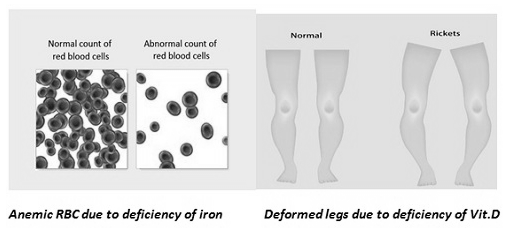
Solution
Question 1.
Name the major nutrients in our food.
The major nutrients in our food are carbohydrates, proteins, fats, vitamins, minerals, roughage and water are essential nutrients for our body.
Question 2.
Name the following:
(a)The nutrients which mainly give energy to our body.
(b)The nutrients that are needed for the growth and maintenance of our body.
(c) A vitamin required for maintaining good eyesight.
(d) A mineral that is required for keeping our bones healthy.
(a) Carbohydrates and fats. (b) Proteins (c) Vitamin A (d) Calcium
Question 3.
Name two foods each rich in:
(a) Fats
(b) Starch
(c) Dietary fibre
(d) Protein
(a) Butter, Groundnut. (b) Rice, Potato. (c) All grains, Fresh fruits. (d) Milk, Fish.
Question 4.
Tick (√) the statements that are correct.
(a) By eating rice alone, we can fulfill nutritional requirement of our body.
(b) Deficiency diseases can be prevented by eating a balanced diet.
(c) Balanced diet for the body should contain a variety of food items.
(d) Meat alone is sufficient to provide all nutrients to the body.
(a) By eating rice alone, we can fulfill nutritional requirement of our body. X (b) Deficiency diseases can be prevented by eating a variety of food items. √ (c) Balanced diet for the body should contain a variety of food items. √ (d) Meat alone is sufficient to provide all nutrients to the body. X
Question 5. Fill in the blanks.
(a) --------- is caused by deficiency of vitamin D.
(b) Deficiency of -------------- causes a disease known as Beri-beri.
(c) Deficiency of vitamin C causes disease known as ----------.
(d) Night blindness is caused due to deficiency of -------------- in our food.
(a) Rickets is caused by deficiency of vitamin D. (b) Deficiency of vitamin B1 causes a disease known as Beri-beri. (c) Deficiency of vitamin C causes disease known as scurvy. (d) Night blindness is caused due to deficiency of vitamin A in our food
Videos
Click on link to view :
1- [video_lightbox_youtube video_id="_BY2BmMYsmE&rel=0" width="640" height="520" start="10" anchor="Part-1"]
2- [video_lightbox_youtube video_id="BXwJ1ACPPk8&rel=0" width="640" height="520" start="10" anchor="Part-2"]
3- [video_lightbox_youtube video_id="HJlWxUZ4QWU&rel=0" width="640" height="520" start="10" anchor="Part-3"]
4- [video_lightbox_youtube video_id="S6xeZKjYWBs&rel=0" width="640" height="520" start="10" anchor="Q&A"]